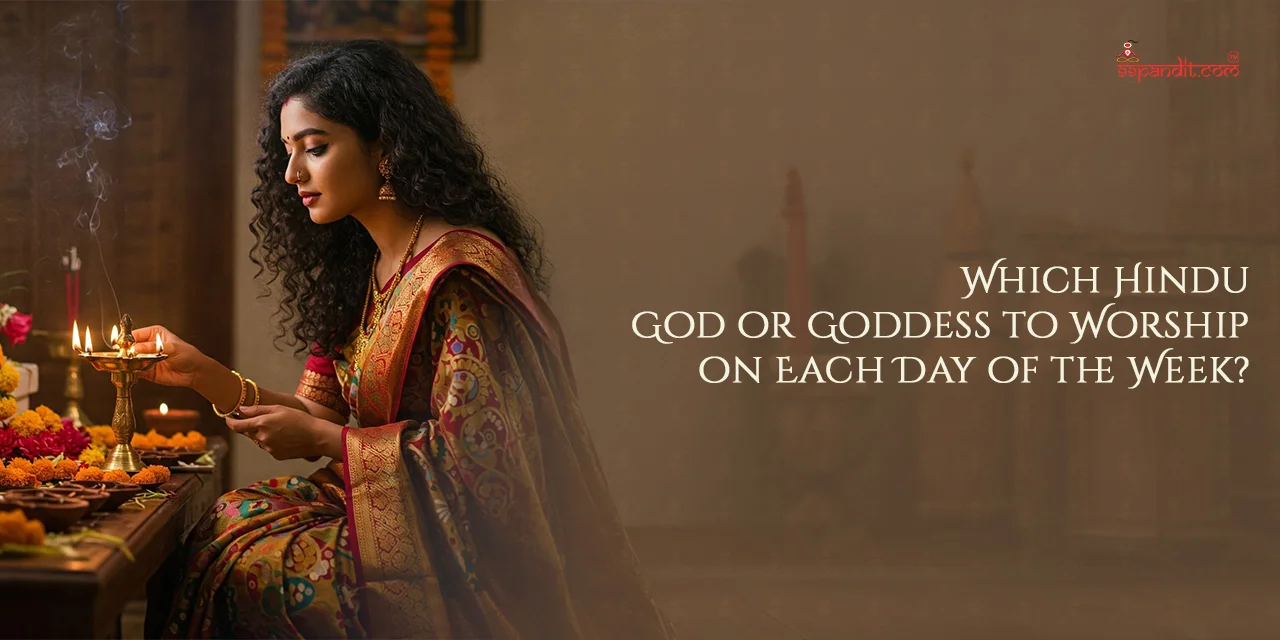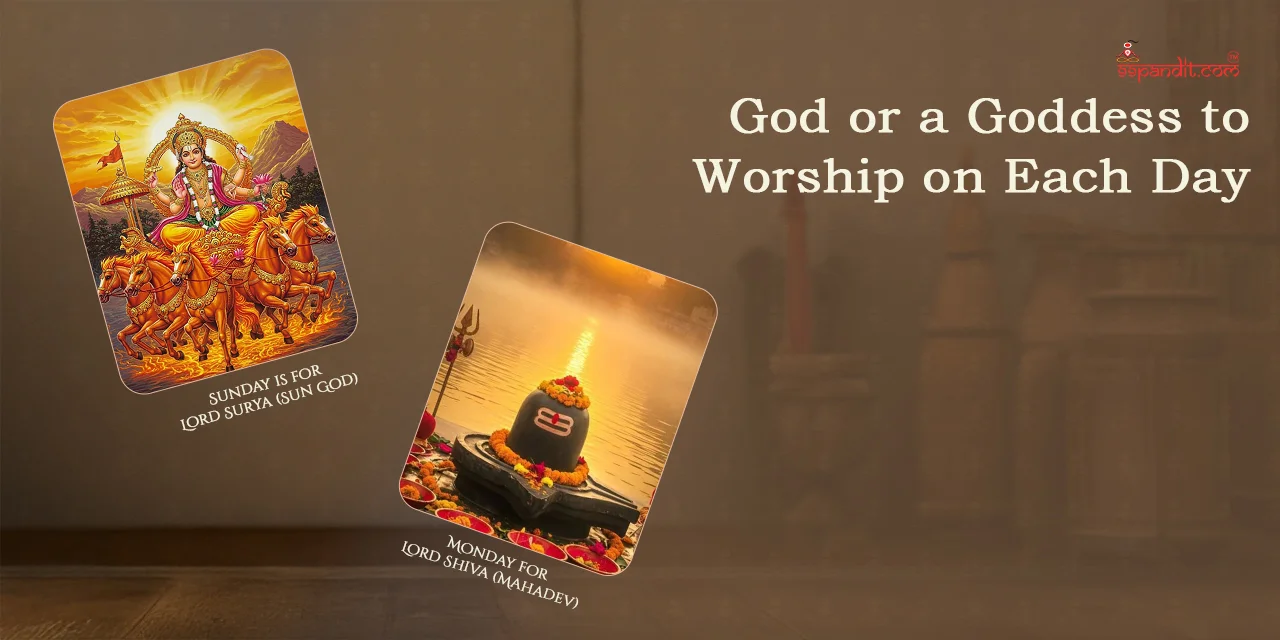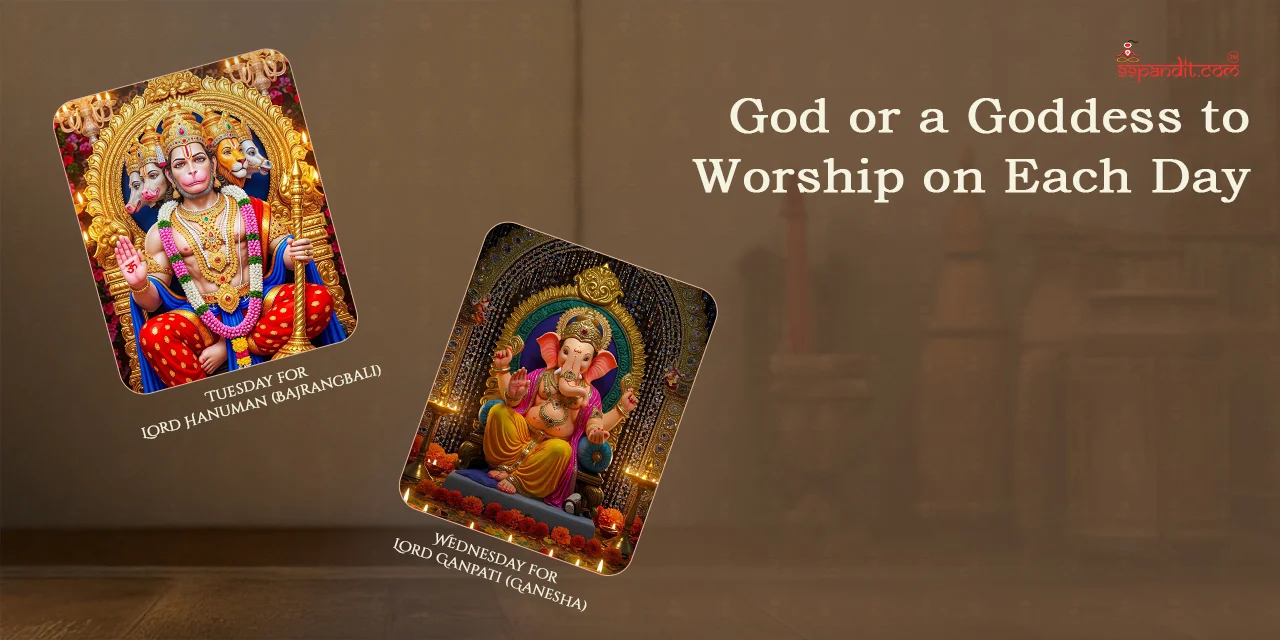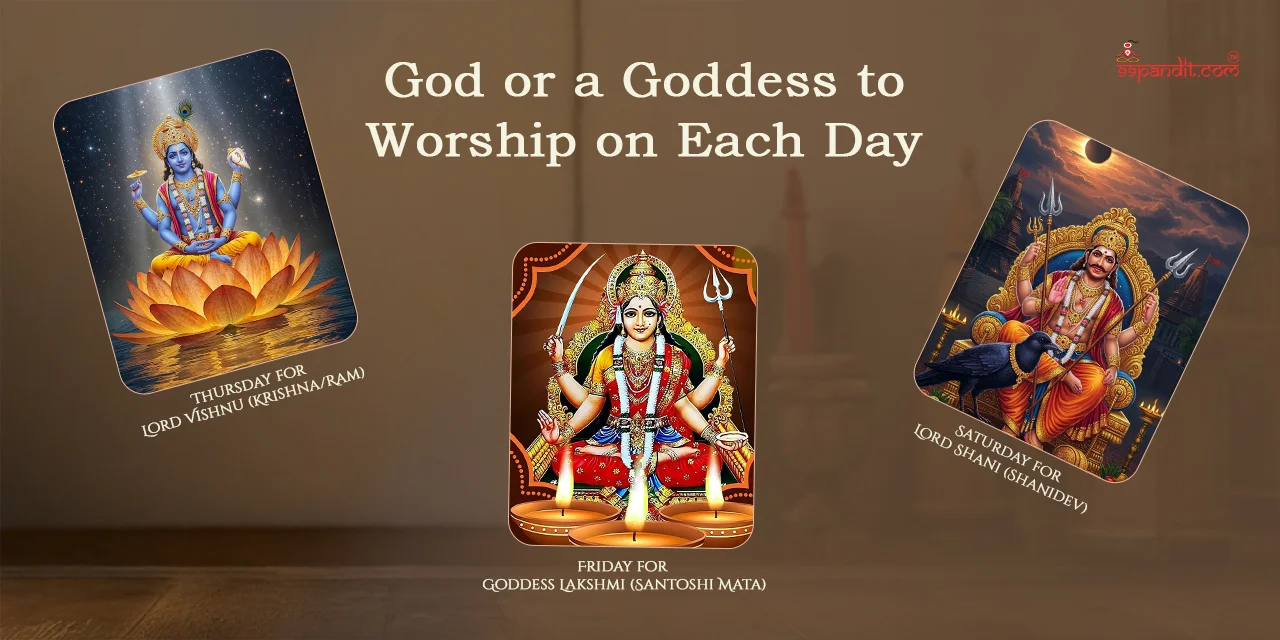108 Names of Goddess Saraswati: Complete List & Meanings
108 Names of Goddess Saraswati: In the Hindu religion, every god and goddess is called by several names. In our…
 0%
0%

Hindu Gods Day of the Week: In Hinduism, each day of the week has a corresponding God and Goddess. Like the day of the week, every day has special meaning and energy, including the spiritual meaning of each day.
The practice of worshiping a specific deity each day, like we worship the universal God, is a beautiful way to pray, and certainly a practice of worship that allows us to receive peace, light, positive energy, and blessings during our lives.

For example, Mondays are for worshiping Lord Shiva, who is gentle yet strong, the destroyer of evil in our world.
Tuesdays are dedicated to worshipping Hanuman ji, who protects and encourages courage. This daily engagement keeps us grounded in who we are and our heritage and gives added spiritual momentum to our lives.
If we can remember God’s qualities, such as strength, peace, kindness, insightfulness, or prosperity, we are ultimately enriched each day!
Although this can certainly involve rituals, it is not grand rituals. According to what I’ve read, it can be simply small prayers, chanting mantras, or even just thinking about God in our minds!
Each day has a spiritual meaning, and worshipping the deity of that day is believed to bring happiness, blessings, and positivity in our lives.
Whether it is seeking strength from Lord Hanuman on Tuesday, peace from Lord Shiva on Monday, or wealth from Goddess Lakshmi on Friday, each day has its own divine energy.
Here is which god or goddess is worshiped on which day and what its significance is in daily spiritual life.
Day-wise Breakdown of Each Deity’s Day:
Sunday is Surya Dev’s Day, the sun who provides light, life, and heat to the entire world. Surya Dev is the symbol of power, health, and self-confidence.
Individuals offer water to the morning sun, recite mantras, and pray for good health, clarity of mind, and success. Surya Dev worship is also beneficial for gaining concentration and energy in life.
Auspicious Color – The lucky colors to wear on Sunday are yellow, orange, and Red. These colors are associated with the sun, which rules Sunday, and are believed to bring warmth, confidence, and enthusiasm.
Lord Shiva (also known as Bholenath) is worshipped on a Monday. He is calm, powerful, and destroys evil.
People pray to Lord Shiva for mental peace, strength to face issues, and relationship happiness.

Many people fast (Somvar Vrat) and take milk, water, and bel-patra leaves to the Shivling. Worshipping Lord Shiva will give us peace and ease our hearts.
Auspicious Color – The lucky colors to wear on Monday are White & Light Blue. White is believed to be the most auspicious color to wear.
It symbolizes purity, peace, and the calming energy of the moon, as well as Kailash Parvat’s ice.
Light blue is also considered calm, serenity, peace, and divine grace, and is also associated with Lord Shiva.
Tuesday is the day of Hanuman, or Bajrangbali (The Strength or Powerful God), who taught all of us to be devoted servants (bhakt) of Lord Ram, and the mightiest bhakt of them all.
Lord Hanuman is not just strong and devoted, but with that strength, Lord Hanuman keeps us safe from evil, fear, and illness.
They pray to Lord Hanuman for strength, protection from fears, and situations that will help them conquer life’s challenges.
Devotees will visit Hanuman temples, pray, and offer red flowers and sweets to Lord Hanuman.
When the devotee prays to Lord Hanuman, they are transferring/sharing their energy, strength, and concentration into the prayer while performing the prayer.
Auspicious Colour: We want to wear red and orange on Tuesday, the colours of Lord Hanuman, whom we want to please.
One can see that Red and Orange are the colours of Strength, Courage, and Positivity.
By wearing these colours, Red and Orange on a Tuesday, we become connected to Lord Hanuman’s energy schedule, balancing and invoking his blessings for Strength, Courage, and Protection.
Lord Ganesha is the conqueror of obstacles and the god of wisdom, and he is worshiped on Wednesday.
They worship Ganesha before starting something new, such as an opening ceremony, wedding, new project, exam, or new job, to ensure their latest endeavor will not involve any obstacles.
Auspicious Color – In connection with Lord Ganesha, the auspicious colors to wear on Wednesday are also green.
Green is Lord Ganesha’s favorite color and the color associated with the planet Mercury, which also governs Wednesday. Green attracts knowledge and peace in our lives.
Thursday is the divine day of Lord Vishnu, who protects Dharma (the moral order) and whose avatars, such as Lord Krishna and Lord Rama, are worshipped by humans.
Vishnu ji brings peace, prosperity, and spiritual development to humans. Devotees usually wear yellow, eat satvik food, and chant mantras such as “Om Namo Bhagavate Vasudevaya.”
Thursday is the right day for people seeking wisdom, professional success, and harmony in the family.
Auspicious Color – Yellow is the auspicious color to wear on Thursday, the auspicious day of Lord Vishnu and the planet Jupiter (Brihaspati).
Yellow is also a color associated with wisdom, prosperity, and happiness, depending on the Indian context; hence, wearing yellow on a Thursday is expected to attract good fortune and blessings from Lord Vishnu.
Friday is the day of Goddess Lakshmi – she is the goddess of wealth, beauty, and prosperity.
People will clean their houses, light diyas, and offer sweets and flowers to celebrate her blessings.
When praying to Lakshmi ji, she brings you financial stability, happiness to your family life, success in business, but also peace and success in your domestic bliss as well.
Auspicious Colour – Friday is dedicated to Goddess Lakshmi. Red, Pink, or White is considered an auspicious colour for Goddess Lakshmi.
Wearing red, pink, or white will be lucky while worshipping Goddess Lakshmi; by wearing these colours with devotion, devotees invoke wealth, prosperity, and good fortune.
Saturday belongs to Lord Shani Dev, the god of justice and karma. He tests people through hardship, but will also favor faithful and hard-working people.
There are people offering mustard oil, black sesame, and saying mantras to reduce bearish influences of Shani (Shani Dosh) in a person’s life.
Lord Shani Dev worship will remove hardship and loans, thus bringing discipline and equality in a person’s life.
Auspicious Color – The auspicious color to wear on Saturday, based on Hindu astrology and the worship of Shani Dev (Shani/Saturn), is black or deep blue.
Black and dark blue are pleasing to Lord Shani and are believed to diminish bad influences associated with the planet.
Sunday – Surya Dev (Sun God): Surya Dev is regulated by health, brightness, and clarity. By remembering or praying to Surya Dev, you will receive concentration, determination, and achievement in your life. This is a perfect day to refuel yourself to start over again.
Monday – Lord Shiva: It is a calm and relaxing day. Lord Shiva provides emotional healing, mental peace, and spiritual strength. Monday is a good day to relax, introspect, and connect with yourself.
Tuesday – Lord Hanuman: Tuesday can be known as an activated day, where strong energy surrounds you.
Lord Hanuman is a great, strong man who gives strength, confidence, and protection. He keeps you strong through difficult situations and helps you fight off negativity.
Wednesday – Lord Ganesha: Midweek brings renewed energy and mental clarity. Lord Ganesha is the obstacle remover and aids with studies, choices, and something beginning.
Thursday – Lord Vishnu (Krishna/Rama): This is the day to bring peace, wisdom, and productive development.
Lord Vishnu keeps the balance and our life intact, and enhances learning, spiritual work, and harmony in relations.
Friday – Goddess Lakshmi: This day belongs to beauty, peace, and harmony, by the Goddess Lakshmi.
Lakshmi ji is the deity for, well, to your fortune within the household peace and love, and happiness, and good day to ponder upon a planning speedo and gratefulness.
Saturday – Shani Dev (Lord of Karma): The seventh day is a day of remembering and honouring, a state of discipline, reflection, and thoughtfulness.
1. Get up early, take a bath, and wear clean clothes before starting your daily puja. Cleanliness and a quiet mind are conducive to connecting with divine energy.
2. Make it a habit to light a diya every day – ghee oil on most days, and mustard oil on Tuesdays and Saturdays. It invites positive energy and takes away negativity.
3. Offer the basic things based on the deity of that day – e.g., water on the sun, milk for Lord Shiva, sindoor and ladoo for Hanuman, durva grass for Ganesh, tulsi and yellow sweets for Vishnu, and sweets and flowers for Lakshmi, and finally mustard oil and black sesame seeds for Shani Dev on Saturdays.

4. Chant the main mantra or stotra for the day’s God/Goddess (even repeating it 11 or 21 times is more than enough). If nothing else, you could simply sit quietly and say their name passionately.
5. Every day, you can offer flowers, fruits, or sweets – remember, a single flower or fruit given with a pure heart is plenty.
6. Try to observe silence or have soft prayer music during the puja time. This keeps the peaceful, focused atmosphere while doing the puja.
7. End by picking folded hands (namaste) and saying a small prayer for peace, strength, and guidance, for your day.
According to Hindu tradition, every day of the week is associated with a particular deity, and constituents are determined accordingly.
On Sundays, Surya Dev is worshipped with red flowers like hibiscus or lotus, a copper vessel filled with water, kumkum, along with ghee diya; for bhog, wheat, jaggery, and red fruits would be offered.
On Mondays, worship Lord Shiva, where it is common to offer a mixture of milk, raw rice, white sweets like peda, bilva leaves, and white flowers. A ghee diya is lit within the pooja, and fresh water or milk is poured over the Shivling.
Tuesdays provide us with worshiping Lord Hanuman, who is offered items like sindoor, mustard oil diya, and red flowers, with bhog boondi, ladoos, jaggery, and bananas.
Lord Ganesha is worshipped on Wednesday, for whom there is provision of yellow marigolds, durva grass, modak, banana for offering, betel leaves, and some incense.
Next is Thursday, dedicated to Lord Vishnu (although you can also worship Krishna/ Shree Ram), which is appropriate for offering yellow sweets, tulsi leaves, yellow flowers, a ghee diya, and a conch (shankh).
Fridays allow a day for Goddess Lakshmi, who is pleased when offered white or pink flowers like lotus and rose, kheer, coconut, according to puja, which keeps a clean altar, incense, a ghee diya, along with little areas for offerings such as coins or rice.
The seventh day of the week is Saturday, which prepares us to worship Shani Dev, along with mustard oil diya, black sesame seeds, urad dal, and so forth.
Daily, even quick, worship helps bring peace, balance, and positivity to life. It allows us to connect with divine energy and lets us pause and reflect on ourselves and what we have to be grateful for.
In Hindu culture, each day of the week corresponds with a different deity, and you focus on each specific blessing by bringing their qualities into your daily life.

Daily puja also creates a structure to your day, which comes along with discipline, devotion, and strength.
You could light a diya, read mantras, or sit, fold your hands, and just be in silence for a few minutes to clear your mind and emotions.
Over time, your belief will allow you to manage stress, bring clarity to your emotions, expand your mind, and essentially attract positive things and people into your life, with less negativity.
Each deity embodies a distinct strength (health, peace, courage, wisdom, growth, prosperity, discipline, etc.), and relating to them one day at a time is about recognizing that we balance that quality throughout the week.
Our tradition is not simply rituals or rules. It is about establishing a rhythm that helps us stay emotionally healthy and spiritually conscious.
Our actions can range from lighting a diya or chanting a simple mantra to taking one quiet moment to recall the divine.
Each action, however complex or simple, adds meaning to something that has become a routine while engaging in bhakti.
When we worship certain deities on certain days of the week, we can remind ourselves about how we want to choose to live intentionally, reflect on our life actions, and carry forward the blessing or realisation of each day’s meaning.
It is not perfect, and there is rarely a complete devotion to the ideal worship. Instead, it is our presence that we show up every day with devotion, gratitude, and a peaceful readiness to engage.

100% FREE CALL TO DECIDE DATE(MUHURAT)

Table Of Content
Filters by categories
All Pujas
Puja On Special Events
Upcoming Pujas
Dosha Nivaran Pujas
Mukti Karmas
Filters by Trending Topics
Filters by Regions
North Indian Pujas
South Indian Pujas